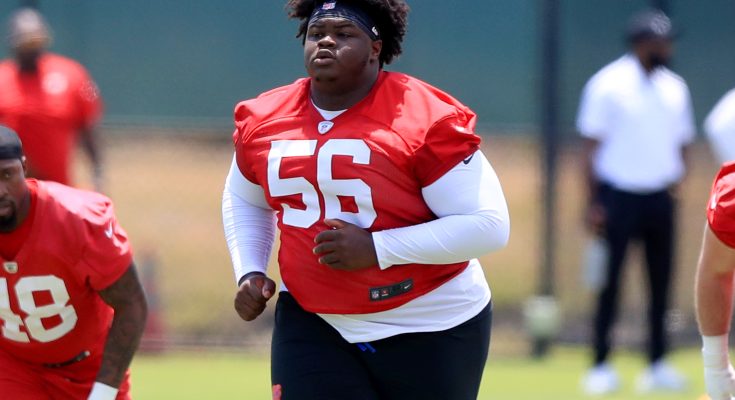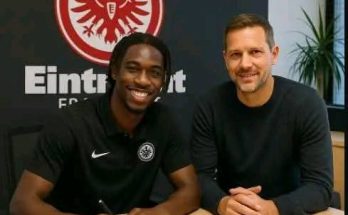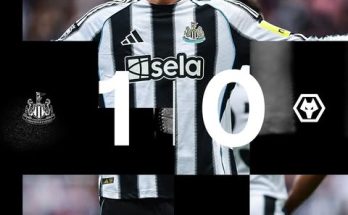Former Florida Gators star defender Gervon Dexter Sr. finds himself at a pivotal moment in his professional football career, as he remains on the non-football injury (NFI) list for the Chicago Bears. Once the centerpiece of Florida’s defensive line and a heralded second-round pick in the 2023 NFL Draft, Dexter’s situation is now shrouded in uncertainty, frustration, and quiet anticipation from the Bears’ front office. As training camp heats up and preseason rapidly approaches, all eyes are now on the young defensive tackle—because, quite frankly, the ball is entirely in his court.
Dexter’s trajectory from high school dominance to college stardom and now to professional ambiguity has been anything but predictable. Coming out of Lake Wales High School in Florida, Dexter was a five-star recruit, one of the top-rated defensive linemen in the country. His combination of size, athleticism, and raw potential made him a dream prospect for any major Division I program. The Florida Gators quickly seized the opportunity, and Dexter soon became a linchpin of their defense. Over his three years at Florida, he displayed flashes of brilliance—quick first steps, powerful hands, and the ability to clog the middle against both the run and the pass. While he was often inconsistent in terms of motor and pad level, scouts and coaches alike believed his ceiling was enormous. That belief led to his selection by the Bears with the 53rd overall pick in 2023, part of the team’s ambitious plan to reconstruct a dominant defense.
The early NFL reviews on Dexter, however, were mixed. As a rookie, he logged time in all 17 games, registering modest stats with limited snaps. Still, there were moments—particularly in late-season divisional games—where his impact was felt. He pressured the quarterback, batted down passes, and occasionally looked like the dominant interior force the Bears had hoped for. But the offseason brought a different storyline. Dexter reported some lingering discomfort and minor injury issues, though the Bears never made public the exact nature of the ailment that led to his placement on the NFI list to begin 2025 training camp. Some insiders speculate it could be related to lower-body strain from offseason training activities away from team supervision. Others believe it’s precautionary, especially since players on the NFI list can be activated at any time. Yet what makes this situation particularly murky is that no clear timetable has been laid out—not by head coach Matt Eberflus, not by general manager Ryan Poles, and not by Dexter himself.
In professional sports, particularly the NFL, being on the NFI list is a double-edged sword. It allows a team to retain control over a player while keeping them off the field until deemed physically ready, and it also suggests the injury wasn’t incurred while under direct team activity. That’s an important distinction in contract language and salary implications. For Dexter, it means the Bears technically don’t have to pay his full salary if he remains on the list into the regular season. That may sound harsh, but it’s the nature of the league. That being said, all current indications are that the Bears have no intention of playing hardball with Dexter—unless this ambiguity persists into the fall.
The team needs him. The defensive line, while improved with acquisitions and the development of younger players, lacks a true interior disruptor who can collapse the pocket consistently. Dexter was supposed to be that guy. The franchise isn’t treating this situation as disciplinary or punitive. Instead, they’ve remained tight-lipped, indicating it’s more about Dexter’s readiness—mentally and physically—to return. In that regard, the phrase “the ball is in his court” carries tremendous weight.
For Dexter, this moment isn’t just about recovering from an unspecified injury. It’s a challenge to prove that he’s ready to take the next step, both as a player and as a professional. He’s at the stage of his career where potential is no longer enough. In year two, rookies are expected to mature, to grasp schemes better, to handle their bodies more effectively, and to contribute consistently. The Bears believe in his raw tools. But they also know raw tools don’t win football games unless they’re sharpened and wielded with purpose.
Teammates have been publicly supportive. Veteran defensive linemen and team leaders have expressed optimism about Dexter’s role once he returns. Several have mentioned in interviews that “he’s grinding behind the scenes” and “working his way back.” Yet when reporters ask for more specifics, there’s a notable lack of clarity. That might be by design. NFL teams are notoriously opaque about injuries, especially in the offseason. Still, in an environment as competitive and cutthroat as the NFL, opacity breeds speculation. For Dexter, who already came into the league with questions about his consistency and effort level, the lack of transparency only fuels more concern.
Privately, there’s growing curiosity—if not impatience—within the Bears fanbase. Social media forums and sports talk radio programs in Chicago are beginning to raise the question: why isn’t Dexter on the field? Why does it feel like there’s a disconnect between his potential and his availability? To be fair, those criticisms may be premature. The Bears haven’t indicated any setbacks, and Dexter is still young, entering just his second professional season. But perception in the NFL is powerful. Absence, especially unexplained absence, often casts a longer shadow than performance. And in the Bears’ front office, they are certainly aware that 2025 is a critical year—not just for the team’s playoff aspirations but also for the development of its recent draft investments.
If Dexter returns in August or early September and reclaims his role, all of this speculation will be forgotten. NFL narratives change quickly, often within a single game. One impactful performance—a sack on a third down, a forced fumble, a dominant series against a divisional rival—and the narrative shifts back in Dexter’s favor. He becomes the player fulfilling his destiny. But if he remains sidelined, or if the injury lingers into the regular season without improvement, the Bears will have to make tough decisions. Not necessarily cutting him—after all, second-round picks are rarely released this early—but possibly reshuffling the depth chart or investing elsewhere for long-term help on the defensive line.
The locker room dynamic also plays a part in this situation. NFL players are notoriously observant of how others handle adversity, injury, and accountability. If Dexter is truly working hard behind the scenes and showing teammates he’s committed to returning stronger, that message will resonate. But if players begin to sense ambivalence—or worse, detachment—it could fracture internal trust. So far, there’s been no indication of the latter, but the longer Dexter remains away from full participation, the more questions will arise. Players, coaches, and staff all understand that injuries are part of the game. What they want to see is how a player responds.
From a broader perspective, Dexter’s situation is emblematic of a growing tension in the NFL between player independence and team control. Modern athletes have more tools than ever to train, recover, and monitor their health away from their team’s facilities. They work with personal trainers, nutritionists, biomechanical experts, and specialists. But that also means more opportunities for injury outside the team’s immediate supervision. The NFI designation is increasingly used in these gray-area cases. While teams want players to train hard in the offseason, they also fear what can happen when that training goes awry. Dexter may simply be caught in that modern dilemma—working to improve but sidelined by the very process meant to prepare him.
There’s also a psychological angle. For many young players, especially those who dominated at the high school and college levels, transitioning to the NFL is not just a physical challenge—it’s an emotional one. Struggling with injuries, dealing with media scrutiny, and adjusting to the brutal pace of the league can take a toll. For someone like Dexter, who was a star from day one in Gainesville, navigating these new waters might be more difficult than most fans realize. If his time away from the field is also serving as a mental reset, it may be the best thing for his long-term development—even if it tests the patience of those around him.
Ultimately, the Bears remain hopeful. The coaching staff, while measured in their public comments, has not shown signs of frustration or disappointment. That’s telling. They seem to believe Dexter will return—sooner rather than later—and when he does, he’ll be better for it. That optimism, however, won’t last forever. The NFL calendar moves fast. Each practice missed is a rep lost. Each preseason game sat out is an opportunity wasted. And each week that goes by without clarity makes it harder for Dexter to reassert himself.
What happens next is up to Gervon Dexter Sr. The door is open. The team believes in his upside. The fans are waiting. But the league is unforgiving, and time is precious. If Dexter wants to reclaim the arc that made him a star at Florida and a high draft pick in the NFL, now is the moment to act. The ball is in his court.



